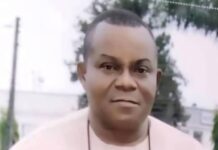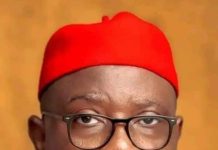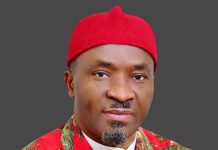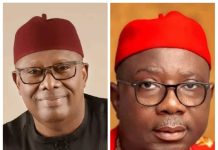By Tony Okoroji
The year was 1981. The studios of the international recording company, EMI, on Oregun Road, Ikeja, had just been commissioned. Courtesy of the iconic music producer, Odion Iruoje, at whose behest I had done some production work at Decca, I joined EMI as a Producer and Artiste & Repertoire Manager at a very young age.
EMI was then clearly, the center of the Nigerian music industry. It was a challenge managing the endless flow of artistes, young and old, who wanted to benefit from the fame of EMI and the brand-new recording technology installed at the Oregun Road recording studios.
It was on one of those days during which I listened to demo tapes from so many aspiring artistes, some of them, good; some of them not so good and many, down right awful, that this very young man walked into my office. He was very tentative but announced to me that he will be a star. I asked for his demo tape. He had none. My first reaction was that this young man was a joke. He ought to have known that you do not come to a big company like EMI looking for a recording contract without at least, a demo tape.
I had to control myself not to throw him out. There were many people at the reception area waiting to see me who were better prepared. I looked at him but did not ask him to leave. Something in his eyes held my attention. He was desperate. I asked him to sing for me. Without waiting a second, he opened his lungs and bellowed out a song. I asked him to sing another song. He did and I was intrigued. I liked his falsetto. The young man, though raw, was clearly talented. Could I get him to perform professionally?
I enquired about his family. I found out that he had lost his parents early and lived with his uncle, an engineer, who just could not deal with the idea that of all thing in the world, Adekunle, his nephew and ward, wanted to play music. One of the reasons young Adekunle Falola had no demo was that he did not have the money to pay for one. There and then, I decided that if there was anything I could do to make this young man realize his dream, I was going to do it.
One thing was clear: there was no way he could make progress in his chosen field while living with his uncle. I asked him if he could move in with me. He readily agreed. I lived in a three-bedroom flat in Mafoluku Oshodi, very close to the international airport. Shortly after, Kunle moved in with me. We shared everything: breakfast, lunch, dinner, song writing, rehearsals, travelling and a lot of laughter. He went to work with me and came home with me, every day.
I was putting finishing touches to the recording of my cross-over album, “Juliana” Kunle was with me in the studio, day and night. He was a quick learner and fun to be with. When “Juliana” was released, the song “Oriaku” became a big hit.
Not long after the release of “Juliana”, I sent a memo to EMI Managing Director, Bode Akinyemi, explaining why EMI had to sign on Adekunle Falola, who had agreed with me to adopt the professional name, Dizzy K. Falola. Dizzy was the name his friends called him in school. “K” came from Kunle, the short form of Adekunle. He was young, gifted and sharp; ready to learn and ready to compete.
My request was approved and we set out to record Dizzy K. Falola’s first album, “Excuse Me Baby”, deploying basically the same back-up musicians I had used in ‘Juliana”. In 1982, Dizzy K’s “Excuse Me Baby” was released. The radio DJs liked him. The girls loved him. Dizzy K. Falola was in demand. EMI was happy.
At the time, the Nigerian music scene was quite competitive. Dominant were such new wave singers as Kris Okotie, Jide Obi, Nelly Uchendu, Oby Onyioha, Dora Ifudu, Christiana Essien, Onyeka Onwenu, etc. This group was joined by the likes of Felix Lebarty, and the reggae brigade of Majek Fashek, Ras Kimono, the Mandators, Tera Kota, Peterside Ottong, etc.
It was during the same period that Ben Murray Bruce’s Silverbird Production serially promoted several American stars at the National Theatre in Lagos, such as the Whispers and Evelyn ‘Champagne’ King. An explosive Dizzy K Falola was invariably the opening act for each of the shows. He proved that he was not just a singer but a true showman and the legend grew.
We were back in the studios. My album, “Juliana” was followed by “Mama & Papa” and “Locomotion”. Dizzy K’s “Excuse Me Baby” was followed by “Be My Friend” which had the big hit, “Baby Kilode?”. Thereafter, there was “Sweet Music” and “Traffic Jammer” Out of the studio, we were constantly touring the country and doing numerous live shows.
With the unceasing adulation of a bevy of young women, you would expect the charming Dizzy K to get lost in the moment. No! He found love with a young girl called Laide, schooling in Abeokuta. We called her “L.A.”. “L.A.” stood for both her name, Laide and ‘Lagos-Abeokuta’, the drive that Dizzy K did repeatedly in his blue Volkswagen Beetle, to water the love between him and his young sweetheart. Dizzy K. and L.A. quietly tied the knots about 1983 and their first son, Bobby came about a year later.
In 1989, Dizzy K, whom I fondly call “Dazzle Cake”, left for the UK with his young wife, L.A. and son, Bobby. Bobby has been joined by sister, Maureen and two brothers, Adebayo and Adele.
The love and friendship between us that began on that crazy day at the studios of EMI in Oregun, has remained solid till today and has spread between the families. Any time I go to the U.K., if I am not in a hotel, I am in Dizzy K’s home, enjoying the delicious Egusi soup of L.A. who has become a barrister and solicitor and a dear friend of my wife, Queen Mary.
Before my son, T.J., migrated to the U.S., he lived with the Falolas in London. Dizzy K Falola, who pastors the Power Church International and runs Print Ministries in London, continues to produce gospel music. He is a very special person. We talk on the phone practically every day and our friendship, is one that will never die.
I owe special thanks to our mutual friend, Morgan Felix Okunuga of Culture Gate Africa, who has chosen October 27 to November 3, 2024 to celebrate my brother and friend, a true icon of the Nigerian music industry, in a big way. God bless you, Morgan.
















